STEM BUILD at UMBC leads to real institutional change benefiting all STEM students
By Sarah Hansen
From its outset, STEM BUILD at the University of Maryland, Baltimore County (UMBC) has had a unique vision. Unlike other highly successful scholars programs at UMBC, STEM BUILD’s motto is “500, not 50.”
The program’s purpose is to identify effective interventions that could be implemented at scale to support all science, technology, engineering and math (STEM) students at UMBC, and to find ways to continue those interventions beyond the existence of STEM BUILD.
“Looking back on nearly 10 years of work, STEM BUILD has been nothing short of wildly successful,” said Justine Johnson, executive director of STEM BUILD at UMBC.
STEM BUILD was carefully designed as a controlled research study, where evaluators randomly assigned students accepted into the program into three cohorts.
BUILD Trainees benefited from the most interventions, such as monthly community meetings, intensive monitoring and advising, and multiple group research experiences during ‘Summer Bridge’ programming. Another cohort lived on campus in the STEM Living Learning Community (LLC)—which did not exist prior to STEM BUILD—along with the Trainees, but did not receive additional interventions. A third cohort consisted of similarly qualified students who did not receive targeted interventions or live in the STEM LLC.
According to an analysis by the evaluation team, by the end of their fourth year at UMBC, BUILD Trainees had increased their reported sense of ‘research self-efficacy’ from 3.50 to 3.87 on a five-point scale, which registered at the highest level of statistical significance. Students in the other two cohorts shifted from 3.66 to 3.61, which was not statistically significant.
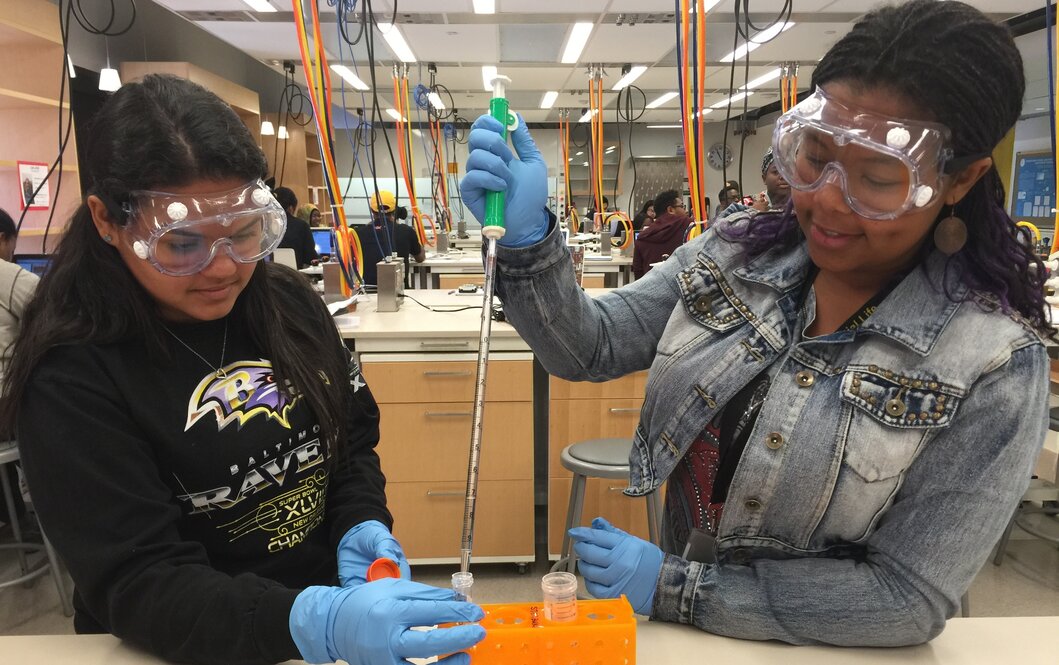
Victoria Baskerville and BUILD Training Program colleague, Isis Cabassa, preparing dilutions in class on Sept. 15, 2015. Photo by Laura Ott.
Victoria Baskerville, a former program Trainee who graduated in 2019 with a degree in biological sciences, said the research experiences provided by the program were invaluable.
“They gave me the confidence to navigate in a lab space and gave me the competitive edge I needed to get my position as a technician in a prestigious lab,” said Baskerville, who is currently pursuing her PhD in integrative and biomedical physiology at The Pennsylvania State University.
“I have often received positive comments regarding the amount of research experience I gathered as an undergraduate during interviews,” Baskerville said.
Positive outcomes
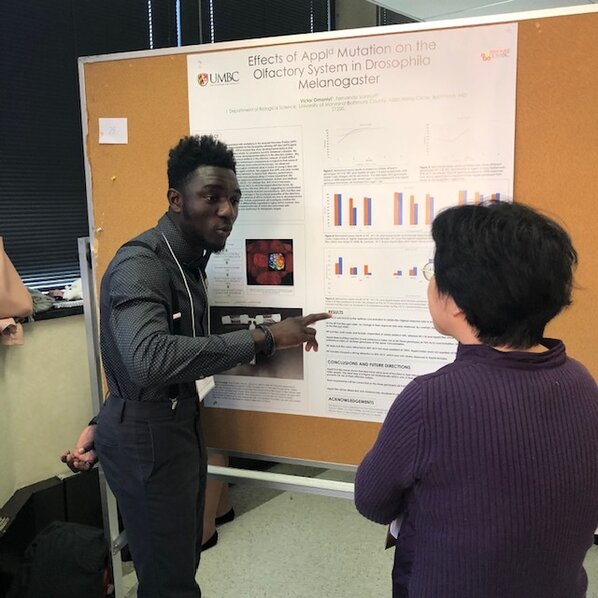
Victor Omoniyi (left) presenting research at the 2019 UMBC Undergraduate Research Symposium.
BUILD Trainees reported completing significantly more research experiences than students in the comparison groups: 45.4% completed one to three research experiences, 33.7% participated in four to six research experiences, and 9.9% completed seven or more research experiences. That’s compared to 53.1%, 10.6%, and 1.9%, respectively, in the comparison groups.
Outcomes for BUILD Trainees in cohorts one through five as of fall 2023 were similarly outstanding, with 56% of trainees having completed a bachelor’s degree, 16% having completed or being enrolled in a master’s program, 13% attending professional school and 11% pursuing PhD or MD-PhD programs. All together, 95% of Trainees either completed their undergraduate degrees, or are actively pursuing or have completed an advanced degree.
Victor Omoniyi, a former STEM BUILD Trainee who graduated in 2020 with an undergraduate degree in biological sciences, is currently pursuing a PhD in neuroscience at Johns Hopkins University, in the cellular and molecular medicine program.
“BUILD was helpful in starting my scientific journey and exposing me to different areas of research and people to network with, which has contributed significantly to where I am now, pursuing a PhD,” Ominiyi said.
Expanding the impact
STEM BUILD’s impact goes far beyond its direct benefits to BUILD Trainees. UMBC’s College of Natural and Mathematical Sciences (CNMS) has implemented numerous new programs as part of STEM BUILD that will continue supporting all students after BUILD officially ends—meeting the “500, not 50” goal.
For example, the Active Learning, Inquiry Teaching (ALIT) certificate program is designed to support faculty in adopting teaching approaches that foster the retention of students in STEM majors and support the development of their students as STEM professionals. Initially required for BUILD faculty mentors, today the program is available to all faculty in CNMS and UMBC’s College of Engineering and IT, and a related program inspired by ALIT now also exists in the College of Arts, Humanities, and Social Sciences.
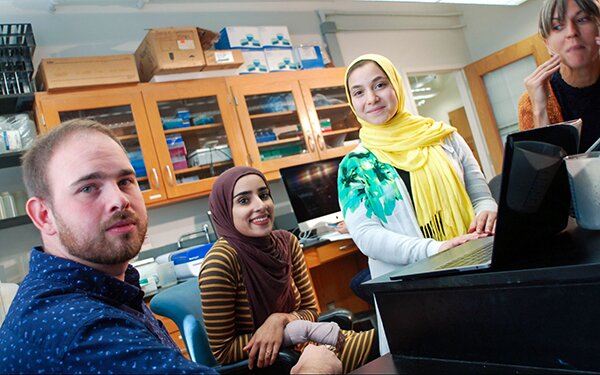
BUILD a Bridge to Summer program interns. Photo Credit: UMBC.
CNMS also developed new courses and summer programs, initially targeting STEM BUILD students but now open to all, focusing on ethics, communication skills, introductory laboratory skills, and more.
CNMS hired a success coach, who offers on-demand mentoring for students in skills like time management, exam preparation, and stress reduction. The coach also offers workshops through The Learning Collaboratory (TLC), another new CNMS initiative. A diversity mentoring program matches STEM students with mentors in STEM from underrepresented backgrounds.
BUILD has even benefited students who attend other universities.
The BUILD a Bridge to STEM Internship has offered students the opportunity to spend the summer at UMBC, learning laboratory skills and then working in small groups to conduct research with UMBC faculty members and present at UMBC’s Summer Undergraduate Research Fest. Students from regional community colleges, Morgan State University, and Gallaudet University all participated, the latter with the full-time support of ASL interpreters.
An enduring legacy
Though STEM BUILD’s 10 years are coming to an end, the institutional change the program has enabled will endure at UMBC.
STEM students will have access to more and better training and professional development opportunities, faculty are employing more effective teaching and mentoring strategies, and scaffolded research experiences are available to prepare students for further study, explained William R. LaCourse, CNMS dean.
As the ideator and champion of many STEM BUILD initiatives that will continue, LaCourse is thrilled to see the impact those initiatives are having on students’ experiences and trajectories.
"It has been my passion and purpose to support all students, especially those who are in the middle of the achievement curve when they arrive at UMBC,” LaCourse said. “The STEM BUILD program showed that every student has the potential to excel as a scholar, if given the opportunity and support.
By infusing the interventions developed in STEM BUILD into the four-year curriculum for all students, maybe our motto should have been ‘5,000, not 50.’”
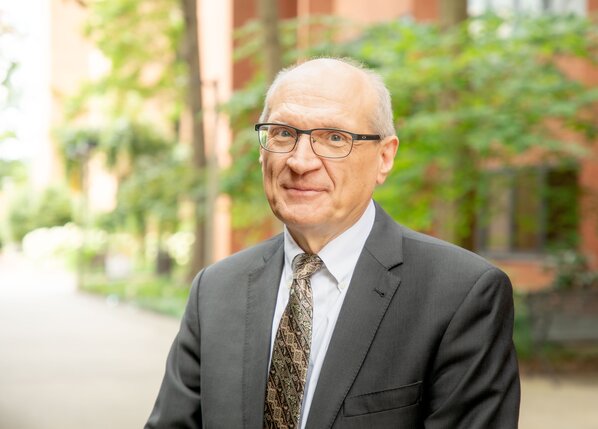
Dean William R. LaCourse. Photo credit: Melissa Penley Cormier/UMBC.
ReBUILD Detroit scholars earn top honors during University of Detroit Mercy's Undergraduate Research Week
By Madeline Byrne
The University of Detroit Mercy took part in The Council of Undergraduate Research's 2024 Undergraduate Research Week, a dedicated celebration of undergraduate research and creative inquiry.
ReBUILDetroit scholars presented their outstanding work during the event and received key awards, demonstrating the breadth and quality of undergraduate research at Detroit Mercy.
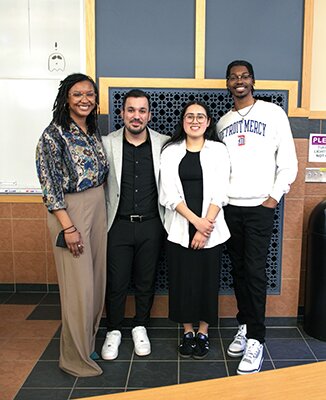
From left: Chelsey Spriggs, PhD, Fadi Koria, Kenia Contreras, and Carvin Coleman.
Scholar Carvin Coleman received the Rising Star Award, highlighting his promising potential and dedication to research. This recognition is given to students who show exceptional promise early in their academic careers.
The All-Star Award was given to Scholar Kenia Contreras for her extraordinary achievements and leadership in research. This accolade is awarded to a student who has made a lasting impact through their research efforts.
“ReBUILDetroit has given me the tools for success and provided me with a home away from home. It was a pleasure to be able to present my research to my peers through URW,” said Contreras.
Scholar Fadi Koria was named an All-Star finalist, reflecting his significant contributions and consistent excellence in research. His work has drawn attention for its depth and rigor.
The event concluded with a keynote address by Chelsey Spriggs, PhD, a researcher and assistant professor at the University of Michigan, who spoke about the importance of nurturing young talent in research and academia.
Katy Snyder, Dean of the College of Engineering & Science and a principal investigator for ReBUILDetroit, reflected on the impact that ReBUILDetroit has had on undergraduates at the institution.
"The success of Undergraduate Research Week at the University of Detroit Mercy demonstrates our commitment to providing undergraduate students with high-quality research experiences and providing opportunities to communicate their work to others,” Snyder said. “The recognition of these ReBUILDetroit scholars is a testament to their talent and engagement with our faculty to develop their research skills.”
The Coordination and Evaluation Center at UCLA is supported under award number U54GM119024.

Grow Together.
